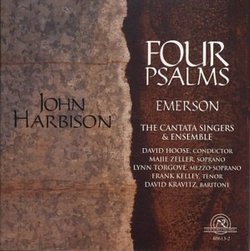| All Artists: John Harbison, Zeller, Torgove, Kelley, Hoose Title: Four Psalms Members Wishing: 2 Total Copies: 0 Label: New World Records Release Date: 1/27/2004 Genre: Classical Styles: Opera & Classical Vocal, Sacred & Religious Number of Discs: 1 SwapaCD Credits: 1 UPC: 093228061328 |
Search - John Harbison, Zeller, Torgove :: Four Psalms
 | John Harbison, Zeller, Torgove Four Psalms Genre: Classical
This release features the premiere recording of one of John Harbison?s major works, Four Psalms, which was commissioned to celebrate the fiftieth anniversary of the founding of the state of Israel. The other work, Emerson,... more » |
Larger Image |
CD Details
Synopsis
Album Description
This release features the premiere recording of one of John Harbison?s major works, Four Psalms, which was commissioned to celebrate the fiftieth anniversary of the founding of the state of Israel. The other work, Emerson, is an a cappella setting of an extract from Emerson?s philosophical prose. The composer describes Four Psalms as follows: "[It] opens with a prelude for mezzo-soprano and orchestra, a prayer composed by Amemar in 454 A.D., which states the major themes of the piece, both musical and philosophical ? There follow four psalms, in Hebrew, alternating with the voices, in English, of people now living. The psalm settings employ fully developed forms?march, antiphon, passacaglia, and aria?suggested by the majesty and mystery of the Hebrew language. In contrast, the contemporary voices are set within brief inventions, their form echoing the momentary illuminations granted to those reflecting upon their own time." Four Psalms received unanimous critical acclaim on its premiere and subsequent performances and is considered to be a major addition to the repertoire of American choral music. Richard Dyer of the Boston Globe offers perhaps the most incisive assessment of it: "The paradigm for a contemporary work combining ancient and modern elements is Benjamin Britten?s War Requiem, and that masterpiece lies behind Four Psalms as much as anything by Stravinsky.... Harbison?s supple craftmanship, his ear for the sound of language and its meaning, his imaginative understanding of orchestral timbre and texture, his mastery of formal disciplines and almost-improvisational flexibility, his experienced handling of the chorus, his knowledge of those solo voices and their personalities?all of these things are highly particular, and through their particularity become universal. More than that there is the overall effect, a sum overwhelmingly greater than its accumulated parts. The mingling of past! and present, of questioning and certainty, and of conflicting certainties, the refusal to accept a merely ceremonial and celebratory role in order to choose a questioning and exploratory one that ends on a quiet and confident note of hope and prayer, is purely Harbisonian, and absolutely essential." Of related interest:
80331 Symphony No. 1
80391 Four Songs of Solitude
80395 The Flight into Egypt
80404 Concerto for Viola and Orchestra
80331 Symphony No. 1
80391 Four Songs of Solitude
80395 The Flight into Egypt
80404 Concerto for Viola and Orchestra

 Track Listings (4) - Disc #1
Track Listings (4) - Disc #1